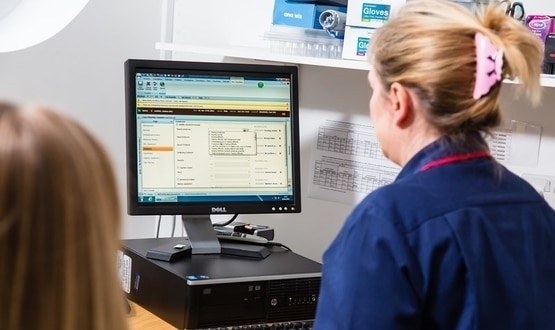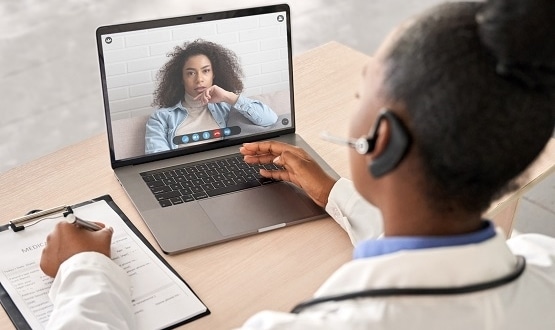NHS Digital tests waters for new £450m GP IT framework
- 20 August 2018

NHS Digital intends to put out a half-a-billion-pound tender for a new general practice IT framework.
The organisation has published a prior information notice to kick-start interest in the new Digital Care Services framework, which will replace the outgoing GP Systems of Choice (GPSoC) agreement.
Dubbed GP IT Futures, the £450 million contract will provide a contract vehicle for GPs, CCGs and other NHS Digital customers to purchase IT systems and services, managed by the national body.
The new framework will extend support to community and mental health providers, as well as to emerging models of care such as GP federations and integrated care organisations.
The prior information notice invites supplies to express interest in the upcoming procurement and offer feedback to NHS Digital.
Martin Warden, director of the digital transformation in general practice programme at NHS Digital, said: “This is a step-change towards ensuring the continued relevance and resilience of primary care IT systems to meet evolving NHS needs.
“The new framework will improve access to GP data for patients and the NHS, as well as enabling digitised workflows in and between care settings to support better patient care.”
Currently, GPSoC enables buyers to purchase systems from four principal suppliers – TPP, EMIS, InPS Vision and Microtest – and bolt subsidiary tools on top.
The GP IT Futures framework will move away from having principal and subsidiary systems to one that supports modularity, with a view to making it easier for new market entrants to provide services to primary care.
It should also make it easier for buyers to shop around which, given a few bad press days for TPP and EMIS in recent months, could prove tempting.
NHS Digital said the arrangement would “enable the purchase of systems and services in a more dynamic market” and “unlock wider benefits for the whole care system”.
The services provided under the new GP IT framework will cover the provision of applications to meet the business requirements of primary care. This includes electronic record and patient management systems for general practice, as well as ancillary services such as document management and clinical support systems.
NHS Digital is particularly keen to hear from suppliers that can deliver new ways of working in general practice and support cross-organisational collaboration.
This includes – but is not limited to – patient record systems for multi-disciplinary settings, digital services that can be integrated into the clinical desktop, patient-facing appointment-booking apps and digital therapy services.
Suppliers have until 31 October to register their interest, with the contract notice expected to be published on 7 January 2019.





15 Comments
Yes Matt,
The idea that the modules will be fully interoperable for starters.
I’m really worried about what is being done here, not least as it fails to help join up practices with the increasing number of embedded staff from other organisations working around the patient in practice and the community. GPSoC was a huge barrier to this, and it seems that IT Futures is taking us further away from the joined up working that underpins community based care.
We do seem to have reached an impossible service with the big 2 suppliers, but destroying their business and the stability of primary care records seems a fools game.
I trust the lessons from the ‘Great Cockup’ in the NHS NPfITsystem a few years ago are documented and analysed? This knowledge should be firmly embedded in any spec. for vendors and any vendors or internal staff involved in the debacle should be given ‘red cards’ for this fixture. If not, we will have it all over again.
Terry,
Every time there is a redisorganisation in the NHS – including but not confined to IT matters – the *first* thing the incoming regime does is to destroy all information regarding experiences from the previous regime.
The NHS is not “an organisation with a memory” – it suffers -aparently by design, intent or mismanagement – from a combination of Alzheimers and Korsakoff syndrome!
Potential vendors might be well-advised to look at past experiences (if the information still exists or is available) for themselves.
And remember, Richard Granger famously said (referring to plans to replace GP systems) “Some loss of function is acceptable” – which led to a sustained campaign by GPs and user groups – who disagreed strongly, – to force observance of the New GMS Contract guaranteeing practice choice of accredited IT system, leading in turn to GPSoC v1..
Mary, there’s a big report on the ‘Great Cockup’ here https://www.cl.cam.ac.uk/~rja14/Papers/npfit-mpp-2014-case-history.pdf
which names a few names you will recognise. There are also numerous reports on other aspects of the NHS by Parliamentary committees, for example the ‘Nearly-as-Great Cockup’ of the Wannacry virus which flattened the NHS in May 2017, exposing not only the parlous state of its cybersecurity but its lack of a disaster recovery (DR) plan. If there was such a plan, it didn’t recover. It is predicted to happen again, along with possible attacks on internet-attached medical equipment (IoT, Internet of Things). Health equipment is high of the list of predicted targets in recent surveys. The nearest we have to a counter-strategy is the Government set of ‘Guidelines’ for IoT vendors’ which seems to me to be a ‘be good chaps there, won’t you and do as we say’. When it happens, poor old Matt Hancock is going to get the custard ‘blame pie’ right in his face, having missed Jeremy Hunt as per the slapstick movies.
The report is great – but, like the Parliamentary & NAO reports – deals with the strategy (which might appear not to have changed much) rather than the implementation of individual projects such as Lorenzo Regional Care (remember that?)
In any case, I would like to be reassured that the strategists and project managers in NHS Digital had read them – and done some sort of root cause analysis on the failure of the failure of NPfIT – and also Care.Data (and the problems around the Australian My Health Record), AND that potential new entrants were obliged to study them as well!
Mary (and others!), I am too far away from the NHS to know the individual projects you name. but can give you some homework on the topic. Try to find any followup actions from the Wachter and the NHS ‘Fit for 2020’ reports. I can’t find any on the internet; just the original documents which, like many such reports, are wish lists with lots of actions but no delivery.
My view is that the treatment offered by the NHS is second to none but the supporting technology usage (note I said ‘technology usage’, not just ‘technology’) and communications internal and external are ‘sub-optimal’, a technical word for abominable. There is ample evidence for this in the public domain and from anyone in the street you care to ask. In essence, the communication processes, if they exist, are broken. I”d love them to be perfect but that is a million miles form the truth.
The trouble can be explained by a Mark Twain quote ‘Everybody is talking about the weather, nobody is doing anything about it.’
Terry, I’m putting in several replies – haven’t worked out how to preserve paragraphs in a Reply – so this could get confusing!
1. Wachter Report etc: I don’t know of any deliveries from any of them: usual PR exercise of announcing “funding” – which mysteriously seems never to actually arrived.
My background is in primary care (GP – retired on 31st March 2013 for obvious reasons) so not in the best position to comment.
2. Communications from a patient point of view: this is from a PHCSG blog in 20114
https://primaryhealthinfo.wordpress.com/2014/12/01/can-integrated-care-satisfy-all-of-freds-needs-including-patient-empowerment/
(Fred started in 2011 – if you enjoy this, look at the other Fred posts in the blog!)
I don’t think any of Fred’s concerns have been addressed – and loss of his Community Matron (on financial grounds) still a grievance!
Mary and others, I am not a medical person so the minutiae discussed go over my head. If you want to see a resume of my ‘communications’ observations, send your address to me; xperassociates1 at gmail dot com
3. IT and communication from an IT/technical point of view
You might find a CLICSIG held in May 2016 of interest
http://www.phcsg.org the “special Interest Groups” “CLICSIG” “Managing the audit trail in shared clinical systems”: the original question was about recreating the information paramedics had used in decision making vs taking a screenshot.
Go down to Fig 1 to reach the discussion on different Views of IT – technical, information, conversation (largely absent) & socio-cultural.
My fear is that NHS Digital is only considering the technical and information views – which are difficult enough, not helped by the dependence of general practice on well-established GP IT systems – and not really interested in the end purpose of improved patient care – which involves communication between everyone (including patients) involved WITH sound procedures to allocate responsibilities!
My 2009 opinion piece for EHealthInsider (now DigitalHealth) “Does Lorenzo mean the end of GP Electronic Health Records?” seems to have been removed – but have you seen the more serious RCGP/CfH report “Shared Record Professional Guidance” http://www.rcgp.org.uk/clinical-and-research/resources/a-to-z-clinical-resources/practice-management-resources/health-informatics-group.aspx (SRPG – keep paging down!)
End
Curious stance within this piece that NHS organisations “should also make it easier for buyers to shop around”, reduces complex software to whether I buy my next music track from iTunes or Spotify.
Although the operating systems within Primary Care are likely to become more patient / app-driven over the next 3-5 years, this doesn’t reduce the huge complexities in meeting the NHS requirement for assimilating Primary to Community / Acute etc. If new entrants arrive with great software but no real mechanic for making it work with existing software, then the problem get worse, and NHS-D shouldn’t permit them entry to the sector. This makes interoperability the single largest standards challenge for NHS-D to deliver on in its new framework.
So, it seems Martin Warden’s prime mission will be to mandate i.e. instruct both existing and new entrants that interoperability is a must-have for the NHS to perform at its best, and NOT some noble aspiration. However, the pressure he / NHS-D will be under from legacy players to retain the status quo will be considerable.
Don’t expect anything exciting. It looks like the old world, but with room for some new entrants. The media around this is a lot more excited than what the reality looks like.
Matt
“If something looks too good to be true it probably is”
& “the devil lies in the detail”
I’d like to see the risk assessment – & mitigations!
What could ^possibly^ go wrong?
Are the new systems intended to be versions of the Single Shared Electronic Patient Record (which can create problems with different record keeping needs in different organisations in addition to clinical governance and curation of the record ) ?
Or is the intention to have a large number of modules which, at any rate theoretically, all work together in any combination?
GP EPRs are long established and transfer of data is reasonably well understood – although every time a record is transfered from one system to another, some things get lost or misinterpreted: is it intended that CCGs (who are effectively making decisions on the system(s) to be used in their patch) will be taking decisions on the systems used not only by GP practices but also by e.g. Virgin Health & other private contractors?
It does seem a pity that NHS Digital is about to make 600 staff redundant in order to employ people more skilled in Cyber & AI: both important but I cannot see any reason why any of them would have any domain knowledge of either NHS or, specifically , GP IT and the wider Primary Care environment.
PS if the GPSoC contract ends at the end of this year, how likely is it that “new entrants” will have anything in place or even on the drawing board by then?
Wow!
This sounds like a massive step forward! I’m usually a negative guy when it comes to NHS Digital, but this is really great!
Am I missing something here? Seems too good to be true!
Comments are closed.